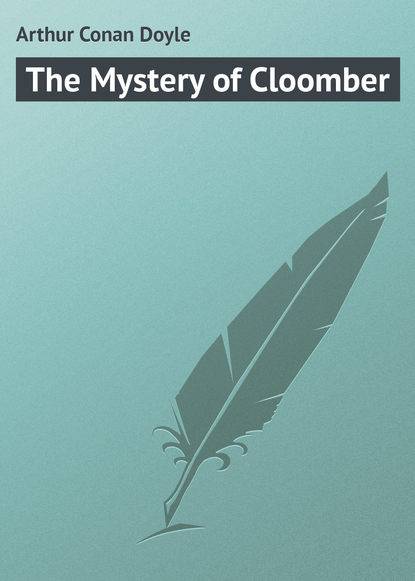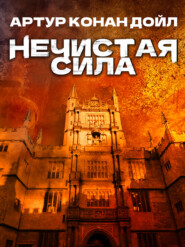По всем вопросам обращайтесь на: info@litportal.ru
(©) 2003-2025.
✖
The Mystery of Cloomber
Настройки чтения
Размер шрифта
Высота строк
Поля
For weeks my poor Gabriel hovered between life and death, and though she came round at last, thanks to the nursing of my sister and the professional skill of Dr. John Easterling, she has never to this day entirely recovered her former vigour. Mordaunt, too, suffered much for some time, and it was only after our removal to Edinburgh that he rallied from the shock which he had undergone.
As to poor Mrs. Heatherstone, neither medical attention nor change of air can ever have a permanent effect upon her. Slowly and surely, but very placidly, she has declined in health and strength, until it is evident that in a very few weeks at the most she will have rejoined her husband and restored to him the one thing which he must have grudged to leave behind.
The Laird of Branksome came home from Italy restored in health, with the result that we were compelled to return once more to Edinburgh.
The change was agreeable to us, for recent events had cast a cloud over our country life and had surrounded us with unpleasant associations. Besides, a highly honourable and remunerative appointment in connection with the University library had become vacant, and had, through the kindness of the late Sir Alexander Grant, been offered to my father, who, as may be imagined, lost no time in accepting so congenial a post.
In this way we came back to Edinburgh very much more important people than we left it, and with no further reason to be uneasy about the details of housekeeping. But, in truth, the whole household has been dissolved, for I have been married for some months to my dear Gabriel, and Esther is to become Mrs. Heatherstone upon the 23rd of the month. If she makes him as good a wife as his sister has made me, we may both set ourselves down as fortunate men.
These mere domestic episodes are, as I have already explained, introduced only because I cannot avoid alluding to them.
My object in drawing up this statement and publishing the evidence which corroborates it, was certainly not to parade my private affairs before the public, but to leave on record an authentic narrative of a most remarkable series of events. This I have endeavoured to do in as methodical a manner as possible, exaggerating nothing and suppressing nothing.
The reader has now the evidence before him, and can form his own opinions unaided by me as to the causes of the disappearance and death of Rufus Smith and of John Berthier Heatherstone, V.C., C.B.
There is only one point which is still dark to me. Why the chelas of Ghoolab Shah should have removed their victims to the desolate Hole of Cree instead of taking their lives at Cloomber, is, I confess, a mystery to me.
In dealing with occult laws, however, we must allow for our own complete ignorance of the subject. Did we know more we might see that there was some analogy between that foul bog and the sacrilege which had been committed, and that their ritual and customs demanded that just such a death was the one appropriate to the crime.
On this point I should be sorry to be dogmatic, but at least we must allow that the Buddhist priests must have had some very good cause for the course of action which they so deliberately carried out.
Months afterwards I saw a short paragraph in the Star of India announcing that three eminent Buddhists – Lal Hoomi, Mowdar Khan, and Ram Singh – had just returned in the steamship Deccan from a short trip to Europe. The very next item was devoted to an account of the life and services of Major-General Heatherstone, "who has lately disappeared from his country house in Wigtownshire, and who, there is too much reason to fear, has been drowned."
I wonder if by chance there was any other human eye but mine which traced a connection between these paragraphs. I never showed them to my wife or to Mordaunt, and they will only know of their existence when they read these pages.
I don't know that there is any other point which needs clearing up. The intelligent reader will have already seen the reasons for the general's fear of dark faces, of wandering men (not knowing how his pursuers might come after him), and of visitors (from the same cause and because his hateful bell was liable to sound at all times).
His broken sleep led him to wander about the house at night, and the lamps which he burnt in every room were no doubt to prevent his imagination from peopling the darkness with terrors. Lastly, his elaborate precautions were, as he has himself explained, rather the result of a feverish desire to do something than in the expectation that he could really ward off his fate.
Science will tell you that there are no such powers as those claimed by the Eastern mystics. I, John Fothergill West, can confidently answer that science is wrong.
For what is science? Science is the consensus of opinion of scientific men, and history has shown that it is slow to accept a truth. Science sneered at Newton for twenty years. Science proved mathematically that an iron ship could not swim, and science declared that a steamship could not cross the Atlantic.
Like Goethe's Mephistopheles, our wise professor's forte is "stets verneinen." Thomas Didymus is, to use his own jargon, his prototype. Let him learn that if he will but cease to believe in the infallibility of his own methods, and will look to the East, from which all great movements come, he will find there a school of philosophers and of savants who, working on different lines from his own, are many thousand years ahead of him in all the essentials of knowledge.
notes
Примечания
1
The old rascal was well paid for his trouble, so he need not have made such a favour of it. – J.F.W.

















